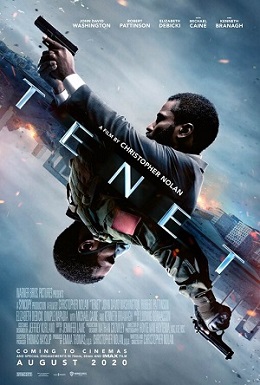‘TENƎꓕ’: Mind-blowing spectacle, lacking in emotional depth

Warner Bros. Pictures [Fair Use]
“Tenet” follows a main protagonist as he tries to prevent an ensuing World War III.
September 8, 2020
“Don’t try to understand it. Feel it.”
Over the past 22 years, Christopher Nolan has made a name for himself as a modern-day auteur in the realm of high-concept blockbusters. His latest film, “Tenet,” which was originally slated to come out July 17, finally received a wide release on Friday, Sept. 4. “Tenet” blew me away with its stunning visual effects and thrilling moments of action, yet it was unfortunately held back by its lack of character development and emotional drive.
Not even a minute into the film, “Tenet” is already exploding with gripping action. The opening sequence hardly gave me a moment to breathe, setting the tone for the rest of the experience as well as introducing the main character, simply named “The Protagonist,” played by John David Washington. The film proceeds to waste no time in introducing its science fiction premise, the source of both its strongest and weakest elements going forward.
Ever since the film was released, there has been one word dominating discussion: spectacle. The sheer scale of the film and the expertise with which Nolan executes his vision is truly awe-inspiring. Each set piece one-ups the last, stunningly accomplished with mostly practical effects. Jaw-dropping action combined with brain-melting sci-fi makes “Tenet” the perfect film if you’re looking for a thrilling ride.
The electrifying score heightens the action and amps up the tension through bass heavy synths and shock wave blasts of sound. Nolan’s longtime collaborator, Hans Zimmer, was occupied with composing the score for “Dune,” so Swedish composer Ludwig Göransson stepped in to create the score. Göransson previously won an Academy Award for his work on “Black Panther,” and his musical expertise certainly shows in “Tenet.” The score is definitely one of the film’s strongest components, yet it could be slightly overwhelming at times, covering up lines of dialogue that might further one’s understanding of the film.
While “Tenet” is absolutely enjoyable for its grandeur, it falls a little flat in its attempt (or lack thereof) to make the audience care about its characters. We hardly learn anything about “The Protagonist” or any of the people he encounters on his mission. With the exception of Elizabeth Debicki’s character, the wife of the film’s antagonist, no one in the film seems to have a strong personal motivation for the goal they are working towards. There are several scenes in the film that could have been far more intense or emotionally impactful had the audience gotten a chance to know the characters better. For example, the thrilling fight scenes in which Nolan bends the concept of time could have been just that much more intense if I had actually cared about the outcome. Not to say that the characters are uninteresting or poorly acted, but it was just too bad they couldn’t have been fleshed out a little more.
The film’s only other major flaw is the incredibly complex plot which can be very hard-to-follow at times, especially when important lines of dialogue are drowned out by the roaring soundtrack. When the viewer does not understand what the characters’ goals are or what is at stake, it is hard to stay invested in the story. As with the film’s emotional distance, the confusing nature of some sequences can completely diffuse the tension, as the viewer has no idea where the conflict is coming from. While it is not entirely impossible to understand the plot, the average viewer shouldn’t need a quantum physics textbook to follow the action.
Even though “Tenet” has its faults, it definitely succeeds in creating a highly entertaining viewing experience that I won’t soon forget. Between the incredible production design and the edge-of-your-seat action, the film will likely please long-time fans of Christopher Nolan as well as casual movie-goers who walk into the theater having no idea what they are about to experience.









